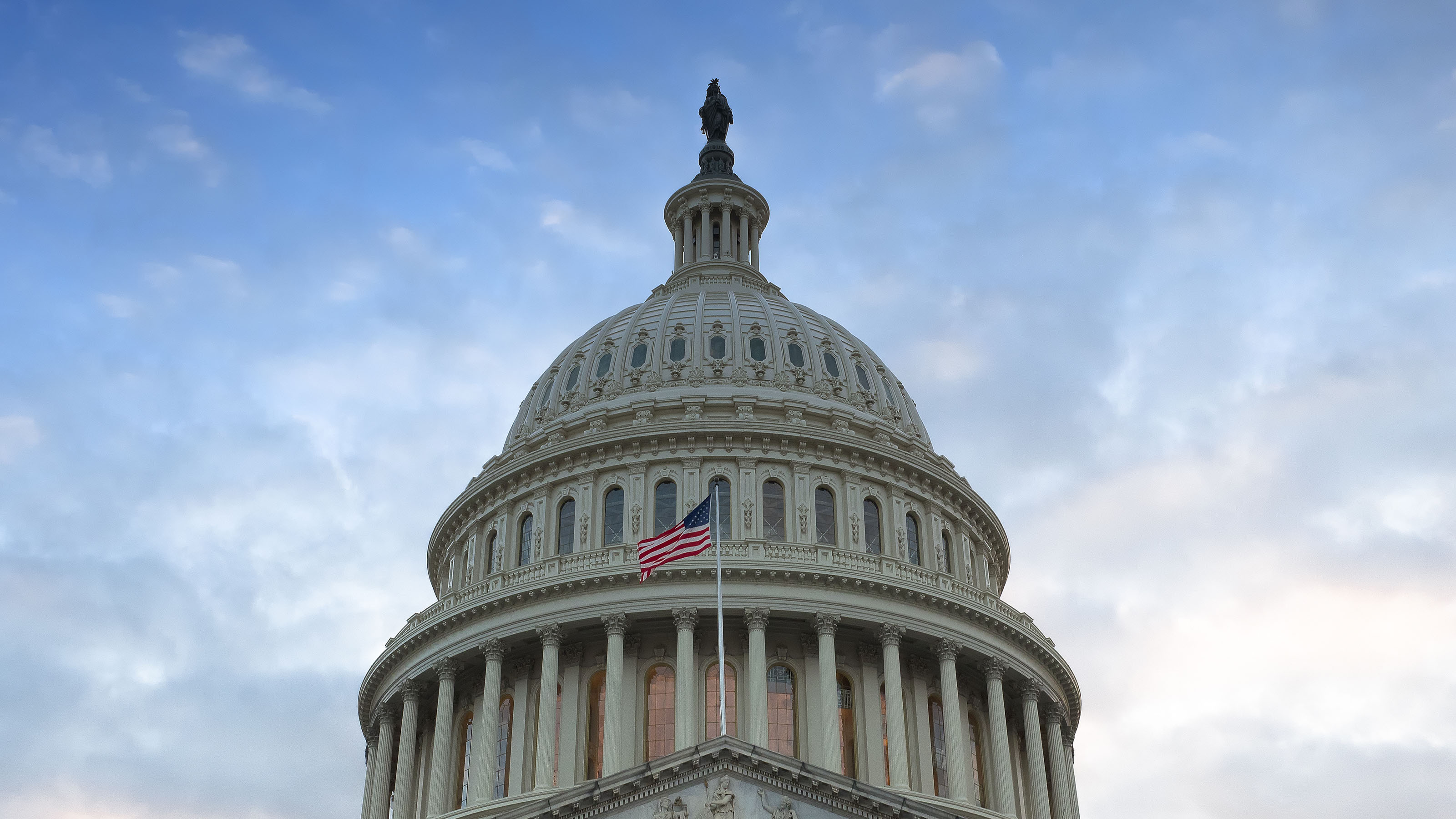HHS Funding Secured As Major Government Shutdown Avoided
With passage of the fiscal 2024 appropriations package, Medicare and Social Security are among the key agencies to receive funding through September 30.


Profit and prosper with the best of Kiplinger's advice on investing, taxes, retirement, personal finance and much more. Delivered daily. Enter your email in the box and click Sign Me Up.
You are now subscribed
Your newsletter sign-up was successful
Want to add more newsletters?

Delivered daily
Kiplinger Today
Profit and prosper with the best of Kiplinger's advice on investing, taxes, retirement, personal finance and much more delivered daily. Smart money moves start here.

Sent five days a week
Kiplinger A Step Ahead
Get practical help to make better financial decisions in your everyday life, from spending to savings on top deals.

Delivered daily
Kiplinger Closing Bell
Get today's biggest financial and investing headlines delivered to your inbox every day the U.S. stock market is open.

Sent twice a week
Kiplinger Adviser Intel
Financial pros across the country share best practices and fresh tactics to preserve and grow your wealth.

Delivered weekly
Kiplinger Tax Tips
Trim your federal and state tax bills with practical tax-planning and tax-cutting strategies.

Sent twice a week
Kiplinger Retirement Tips
Your twice-a-week guide to planning and enjoying a financially secure and richly rewarding retirement

Sent bimonthly.
Kiplinger Adviser Angle
Insights for advisers, wealth managers and other financial professionals.

Sent twice a week
Kiplinger Investing Weekly
Your twice-a-week roundup of promising stocks, funds, companies and industries you should consider, ones you should avoid, and why.

Sent weekly for six weeks
Kiplinger Invest for Retirement
Your step-by-step six-part series on how to invest for retirement, from devising a successful strategy to exactly which investments to choose.
The Health and Human Services (HHS) as well as Defense departments are set to receive funding as part of the six-bill, $1.2 trillion funding package that President Joe Biden signed into law on Saturday (March 23), avoiding any major impact from a partial government shutdown that technically began on the same day.
Under the package, new investments will be made in a number of other agencies and programs as well including the Transportation Security Administration (TSA), the Internal Revenue Service (IRS) and the Department of Education.
The Senate passed the legislation, the second and final six-bill appropriations tranche, by a 74-24 vote, a few hours after the March 22 midnight deadline. It was then sent to the president who signed it into law later that day.
From just $107.88 $24.99 for Kiplinger Personal Finance
Become a smarter, better informed investor. Subscribe from just $107.88 $24.99, plus get up to 4 Special Issues

Sign up for Kiplinger’s Free Newsletters
Profit and prosper with the best of expert advice on investing, taxes, retirement, personal finance and more - straight to your e-mail.
Profit and prosper with the best of expert advice - straight to your e-mail.
In a 286-134 vote on Friday, the House passed the package, which accounts for 70% of government funding. With all 12 appropriations bills now cleared after months of delay in a busy and dysfunctional Congress, the threat of a shutdown is averted for this fiscal year, which ends on September 30.
“The bipartisan funding bill I just signed keeps the government open, invests in the American people, and strengthens our economy and national security,” Biden said in a statement, adding that the agreement is a Democrat-Republican compromise but rejects extreme cuts advocated by some hard-line House Republicans.
“But I want to be clear: Congress’s work isn’t finished,” he said. The House must pass bipartisan national security supplemental legislation, he said, and Congress must pass a bipartisan border security agreement. “It’s time to get this done,” he said.
“The fiscal year 2024 process has not been easy, but I am proud of the legislation this hardworking (Senate Appropriations) Committee has produced — two packages of twelve total individual bills that will fund important government programs, agencies and departments through the end of the fiscal year,” said Sen. Susan Collins (R-ME), vice chair of the Senate Appropriations Committee and Subcommittee on Defense.
She added that the DOD investments in this package “strengthen our military readiness and industrial base, provide pay and benefit increases for our brave servicemembers, and support our closest allies.”
The package consists of funding for Defense, Financial Services, Homeland Security, Labor and HHS, the legislative branch, as well as State and Foreign Operations.
Medicare, Social Security agency funding
For HHS, the package provides about $116.8 billion in funding, including $4.1 billion for the administrative needs of the Centers for Medicare and Medicaid (CMS).
Various other areas and programs that will receive funding include Community Health Centers ($1.86 billion); the Mental Health Block Grant ($1 billion); the Behavioral Health Workforce Education and Training Program ($153 million); the 988 Suicide Prevention Lifeline ($18 million); and Certified Community Behavioral Health Clinics ($385 million).
The Social Security Administration (SSA) would receive $14.2 billion for administrative expenses, an increase of about $100 million over its fiscal 2023 budget.
“These resources will help SSA keep up with rising costs to address service delivery challenges,” Sen. Patty Murray (D-WA), chair of the Senate Appropriations Committee, said in a statement.
“But tight spending caps significantly limit the ability to provide SSA the funding it needs to provide the service that Americans who have paid into Social Security deserve," she said. "Addressing backlogs in key workloads and wait times will require sustained increases to allow SSA to increase staffing and make needed IT improvements.”
Defense funding
For DOD, the package provides $825 billion in total funding, including the agency's requested 5.2% service member and civilian pay raise as well as $29.6 billion for military housing and $8.4 billion for military family subsistence.
Other provisions in the package include $18.3 million to implement recommendations of the Suicide Prevention and Response Independent Review Committee — $10 million above the budget request. It also makes way for $20 million above the budget request to support the Navy’s suicide prevention and response efforts, and $10 million for department-wide suicide prevention. Some $3.3 billion will go toward Defense medical research, among other investments.
“Critically, this bill makes important new investments in the brave men and women who keep our country safe,” Murray said. “It invests in cleanup of forever chemicals on our bases and delivers essential resources to support the wellbeing of servicemembers, including by increasing funding to strengthen suicide prevention efforts and address sexual assault and harassment.”
TSA funding
The TSA is set to receive $1.1 billion for pay equity and compensation-related initiatives aimed at helping the agency with recruiting and retention issues as it responds to "burgeoning" post-pandemic travel volumes.
TSA launched a new compensation plan last July to pay employees at a level commensurate with employees at other federal agencies. Since its inception, the agency said that it has seen a significant drop in attrition and improvement in its ability to recruit for open positions.
IRS funding
The package includes $12.3 billion for the IRS. The funding is expected to help the agency carry out its responsibilities and continued renewed efforts to improve customer service, replace antiquated computer systems and ensure the everyone "pay what they owe in taxes," Murray said.
Education Department funding
Some $79.1 billion is slated for the Education Department to be used for several programs including student aid initiatives that support implementation of more affordable repayment plans and fixes to long-standing issues in student loan forgiveness. It also is intended to help support borrowers in repayment, Murray said.
As of last month, the Biden administration's total student debt cancellation, under various programs, hit nearly $138 billion and covers nearly 3.9 million borrowers, according to the Education Department. This includes some $1.2 billion in student loan debt forgiven under the Saving on a Valuable Education (SAVE) repayment plan.
On March 8, the Senate passed a $460 billion funding package — the first tranche of six appropriations bills — with little time to spare before the bills were set to expire that day. Before that, intraparty fighting, particularly among House Republicans, kept lawmakers for months from doing more than passing a series of short-term funding extensions on all 12 appropriations bills.
On March 22, intraparty fighting in each chamber once again nearly sank the second tranche of bills.
Commenting on the Senate floor on March 22, Senate Majority Leader Chuck Schumer (D-NY) said that it's hard to get things done in a divided government. “Getting things done in this divided government is even harder."
RELATED CONTENT
- How A Government Shutdown Could Affect You
- How Medicare Would Be Affected By A Government Shutdown
- What Will a Government Shutdown Do to the IRS?
- How Social Security Would Be Affected By A Government Shutdown
- What A Government Shutdown Means For Student Loan Payments
- What Does a Government Shutdown Mean for Stocks?
Profit and prosper with the best of Kiplinger's advice on investing, taxes, retirement, personal finance and much more. Delivered daily. Enter your email in the box and click Sign Me Up.

Esther D’Amico is Kiplinger’s senior news editor. A long-time antitrust and congressional affairs journalist, Esther has covered a range of beats including infrastructure, climate change and the industrial chemicals sector. She previously served as chief correspondent for a financial news service where she chronicled debates in and out of Congress, the Department of Justice, the Federal Trade Commission and the Commerce Department with a particular focus on large mergers and acquisitions. She holds a bachelor’s degree in journalism and in English.
-
 5 Vince Lombardi Quotes Retirees Should Live By
5 Vince Lombardi Quotes Retirees Should Live ByThe iconic football coach's philosophy can help retirees win at the game of life.
-
 The $200,000 Olympic 'Pension' is a Retirement Game-Changer for Team USA
The $200,000 Olympic 'Pension' is a Retirement Game-Changer for Team USAThe donation by financier Ross Stevens is meant to be a "retirement program" for Team USA Olympic and Paralympic athletes.
-
 10 Cheapest Places to Live in Colorado
10 Cheapest Places to Live in ColoradoProperty Tax Looking for a cozy cabin near the slopes? These Colorado counties combine reasonable house prices with the state's lowest property tax bills.
-
 5 Vince Lombardi Quotes Retirees Should Live By
5 Vince Lombardi Quotes Retirees Should Live ByThe iconic football coach's philosophy can help retirees win at the game of life.
-
 The $200,000 Olympic 'Pension' is a Retirement Game-Changer for Team USA
The $200,000 Olympic 'Pension' is a Retirement Game-Changer for Team USAThe donation by financier Ross Stevens is meant to be a "retirement program" for Team USA Olympic and Paralympic athletes.
-
 How to Turn Your 401(k) Into A Real Estate Empire — Without Killing Your Retirement
How to Turn Your 401(k) Into A Real Estate Empire — Without Killing Your RetirementTapping your 401(k) to purchase investment properties is risky, but it could deliver valuable rental income in your golden years.
-
 My First $1 Million: Retired Nuclear Power Plant Supervisor, 68, Wisconsin
My First $1 Million: Retired Nuclear Power Plant Supervisor, 68, WisconsinEver wonder how someone who's made a million dollars or more did it? Kiplinger's My First $1 Million series uncovers the answers.
-
 Don't Bury Your Kids in Taxes: How to Position Your Investments to Help Create More Wealth for Them
Don't Bury Your Kids in Taxes: How to Position Your Investments to Help Create More Wealth for ThemTo minimize your heirs' tax burden, focus on aligning your investment account types and assets with your estate plan, and pay attention to the impact of RMDs.
-
 Are You 'Too Old' to Benefit From an Annuity?
Are You 'Too Old' to Benefit From an Annuity?Probably not, even if you're in your 70s or 80s, but it depends on your circumstances and the kind of annuity you're considering.
-
 In Your 50s and Seeing Retirement in the Distance? What You Do Now Can Make a Significant Impact
In Your 50s and Seeing Retirement in the Distance? What You Do Now Can Make a Significant ImpactThis is the perfect time to assess whether your retirement planning is on track and determine what steps you need to take if it's not.
-
 Your Retirement Isn't Set in Stone, But It Can Be a Work of Art
Your Retirement Isn't Set in Stone, But It Can Be a Work of ArtSetting and forgetting your retirement plan will make it hard to cope with life's challenges. Instead, consider redrawing and refining your plan as you go.